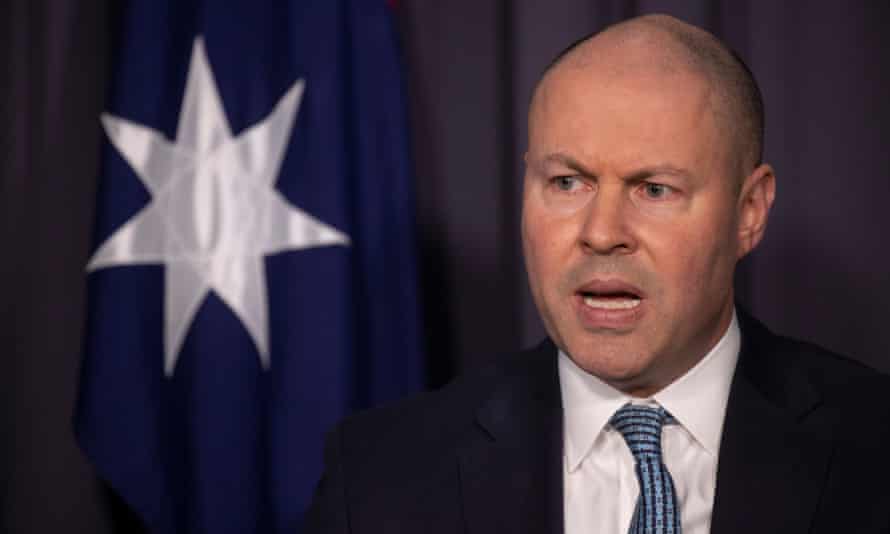Extract from The Guardian
Treasurer links stability of domestic financial system to how Australia’s position on climate change is viewed.

Last modified on Fri 24 Sep 2021 03.31 AEST
Josh Frydenberg will make the economic case for Australia adopting a net zero commitment, warning the country has a lot to lose if others believe “we are not transitioning in line with the rest of the world”.
The federal treasurer will tell business leaders on Friday the Morrison government cannot run the risk of financial markets “falsely” assuming Australia is a climate change pariah because that would increase the cost of capital and undermine financial system stability.
With the Cop26 now bearing down, and with the government attempting to land a formal commitment to net zero by 2050 ahead of the Glasgow conference, Frydenberg will note that trillions of dollars are being mobilised globally in support of the transition, and 129 countries have now committed to reaching net zero emissions by 2050.
“In Australia, in the last 12 months alone, one of our leading banks coordinated more than 50 transactions worth $100bn in climate finance-related activities,” Frydenberg will say.
The treasurer will also note the strong language on climate action recently signed off by the defence minister, Peter Dutton – the most significant player in the right of the Liberal party – and the foreign affairs minister, Marise Payne, after recent talks with their US counterparts.
That statement, which acknowledged climate change was a global security threat, reflected a joint commitment to “make low emissions technologies globally scalable and commercially viable,” which can “make achievement of net zero emissions by 2050 possible.”
The treasurer’s message comes as metropolitan Liberals are growing more frustrated with the National party setting the terms of Australia’s new climate policy commitments. Scott Morrison has been negotiating with the Nationals leader Barnaby Joyce.
After Joyce returned to the Nationals leadership in June, he signalled initially that his party would be unlikely to sign on to a net zero commitment ahead of Glasgow. But the deputy prime minister subsequently softened his position after several colleagues told him that decision was one for the Nationals party room – not a captain’s call.
Some of Joyce’s strongest internal supporters trenchantly oppose a net zero commitment, and Keith Pitt, the minister for water, resources and northern Australia, has made his reluctance plain.
But the party’s former leader Michael McCormack and the former frontbencher Darren Chester have this week argued the case for the government to either adopt net zero or give it serious consideration.
In an interview with the ABC on Thursday night, Joyce declined to provide an update on the status of the internal discussion. “I have to respect the party room I’m a part of and have the great honour of leading, and give them the capacity to also have their views,” he said.
Pressed on whether he was prepared to sign up to a commitment, the deputy prime minister said: “Sign up to what?”
Joyce said the government would need to approach any commitment with “caution”.
The final position is yet to be determined, and Frydenberg’s speech reflects his strongly held view that the Coalition needs to pivot on climate policy. The government is working towards unveiling Australia’s updated climate policy position in the middle of next month, with the Cop26 scheduled for November.
Frydenberg will argue on Friday that failing to signal the inevitability of the transition will have domestic consequences given global capital is backing the shift. He will say Australia’s interest lies in “our markets functioning effectively, so that the financial system remains stable, investors are able to make informed and timely decisions, and capital can be accessed at the lowest possible cost”.
Australia relies on imported capital to fund the economy, either through foreign investment or wholesale funding of the banking system, with around 20% sourced offshore.
“When it comes to commonwealth government bonds, close to half are held by foreign investors,” he will say. “Reduced access to these capital markets would increase borrowing costs impacting everything from interest rates on home loans and small business loans, to the financial viability of large-scale infrastructure projects.”
Frydenberg will say an economy-wide transition is required to deliver a net zero commitment, and that transition will be driven by more investment in emissions reduction strategies across all sectors, including agriculture, mining, and manufacturing.
Appealing to Nationals hostile to the commitment, Frydenberg will argue it is wrong to assume that traditional sectors, like resources and agriculture, “will face decline over the course of the transition”.
“To the contrary, many businesses in these sectors are at the cutting-edge of innovation and technological change.
“There is a message here for business: opportunities will abound and it will be those businesses that recognise these trends and put plans in place to adapt that will have the most promising futures.
“At the same time, there is a message to Australian banks, super funds and insurers. If you support the objective of net zero, do not walk away from the very sectors of our economy that will need investment to successfully transition.
“Climate change and its impacts are not going away. It represents a structural and systemic shift in our financial system, which will only gain pace over time.”
No comments:
Post a Comment